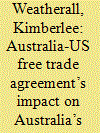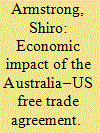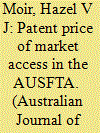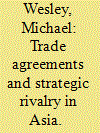|
|
|
Sort Order |
|
|
|
Items / Page
|
|
|
|
|
|
|
| Srl | Item |
| 1 |
ID:
140724


|
|
|
|
|
| Summary/Abstract |
In this paper I examine the extent to which preferential trade agreements (PTAs) limit the Australian government's ability to use public procurement for local industry development ends. I do so not only by examining Australia's PTA obligations, but also by examining how other governments with similar obligations—such as Korea—are using public purchasing policies to promote local industrial advancement. I find that the PTA obligations of the Australian and Korean governments leave them both significant scope to use public purchasing strategically. Interestingly, however, Australian policymakers have been standing still in the room that remains, and even abandoning PTA-compliant procurement-linked development policies. South Korean policymakers on the other hand have been capitalising on every inch of space left open to them—and even experimenting with new forms of strategic public purchasing that nonetheless comply with their international obligations. I conclude by offering some suggestions as to how we might explain these countries’ radically different approaches to procurement policy, despite their very similar international obligations.
|
|
|
|
|
|
|
|
|
|
|
|
|
|
|
|
| 2 |
ID:
140725


|
|
|
|
|
| Summary/Abstract |
This paper explores the origins of investor-state dispute settlement (ISDS) treaties and their implications for the Australian social contract. This analysis includes how and why ISDS emerged in NAFTA, was rebuffed with the failure of the Multilateral Agreement on Investment (MAI), and became incorporated into most subsequent bilateral US trade and investment agreements. The paper considers Australia's exposure to ISDS—first through using it in bilateral investment agreements in nations with inadequate governance mechanisms to support the rule of law, then turning against it when a multinational tobacco company tried to use the mechanism to overturn scientifically endorsed, democratically approved and constitutionally validated tobacco plain packaging measures. The paper concludes by exploring the hypothesis that an alternative governance vision can be achieved in which the system of investment arbitration and trade law is made coherent with presumptively more democratically legitimate normative systems such as constitutional and international law.
|
|
|
|
|
|
|
|
|
|
|
|
|
|
|
|
| 3 |
ID:
140720


|
|
|
|
|
| Summary/Abstract |
Economists have warned for many years that preferential trade agreements (PTAs) will not necessarily increase economic welfare in Australia given the relatively small size of the economy and the country’s lack of negotiating coin. The Productivity Commission cautioned in its major report on PTAs that there seemed to be a mindset of ‘agreements for agreement’s sake’, in part because of fears of missing out on a bandwagon that has attracted Australia’s major trading partners. Political and security considerations have played an important role in shaping Australia’s approach to PTAs. When politics trumps economics in negotiations of PTAs there is a risk of a rush to premature agreement that produces sub-optimal outcomes, that undermines broader plurilateral and global negotiations, and that introduces new and undesirable distortions in trade and public policies. Various theoretical approaches to trade policymaking provide insights into why Australian governments have been willing to conclude these sub-optimal deals.
|
|
|
|
|
|
|
|
|
|
|
|
|
|
|
|
| 4 |
ID:
140722


|
|
|
|
|
| Summary/Abstract |
The Australia-US Free Trade Agreement (AUSFTA) required extensive changes to Australian copyright law. This paper assesses the impact of these changes one decade on. It considers, first, whether the costs and/or benefits predicted in 2004 have eventuated, finding clear evidence that AUSFTA has undesirably constrained domestic copyright policy, but no clear evidence either of the feared financial costs to society, or, importantly, the touted benefits to copyright owners. The most significant impact of AUSFTA’s copyright provisions, however, appears to have been on Australia’s copyright trade policy. Pre-AUSFTA, Australia promoted multilateral standards and mostly sought to comply with, but not exceed, international IP standards. Post-AUSFTA, Australia has pursued an approach akin to that of the US: endorsing international copyright rules that are significantly stronger, and more detailed. The paper queries whether this shift has been in Australia’s national interest, and raises interesting questions of path-dependence in policymaking and trade negotiations that warrant more, and broader attention in the literature.
|
|
|
|
|
|
|
|
|
|
|
|
|
|
|
|
| 5 |
ID:
140721


|
|
|
|
|
| Summary/Abstract |
The Australia–United States Free Trade Agreement (AUSFTA) came into effect in 2005. It was the second preferential trade agreement that Australia signed, after its agreement with Singapore, and marked a departure from the primacy of Australia's previous trade policy of unilateral and multilateral trade liberalisation toward preferential liberalisation. This paper assesses the economic effects of AUSFTA by applying the Productivity Commission's gravity model of trade from its Bilateral and Regional Trade Agreements review. The evidence reveals AUSFTA resulted in a fall in Australian and US trade with the rest of the world—that the agreement led to trade diversion. Estimates also show that AUSFTA is associated with a reduction in trade between Australia and the United States.
|
|
|
|
|
|
|
|
|
|
|
|
|
|
|
|
| 6 |
ID:
140723


|
|
|
|
|
| Summary/Abstract |
New generation trade agreements reach far behind borders, affecting many areas of domestic policy not previously associated closely with trade. One of the most uneasy of these areas is intellectual property, particularly patent monopolies. The USA has been a major force behind the extended reach of patent monopolies using preferential trade agreements. The patent and data exclusivity provisions of the AUSFTA were proposed by the USA. This paper provides detailed evidence about how such ‘TRIPS+’ policies compare to a balanced patent policy—one equally favouring creators and users of technology. Australia has never had an active patent agenda, but since AUSFTA has been willing to accept in its bilateral and regional trade deals highly prescriptive rules that tie the hands of future governments. The overall trend has thus been toward increasing imbalance, with Australian patent policy now having a very broad reach and very low eligibility standards. This particularly affects the cost of medicines, where large numbers of relatively uninventive patents surround a blockbuster drug and delay the market entry of generic alternatives. In addition to outlining the costs of Australia’s current patent policy approach, the paper concludes by highlighting a more balanced and less costly way forward.
|
|
|
|
|
|
|
|
|
|
|
|
|
|
|
|
| 7 |
ID:
140719


|
|
|
|
|
| Summary/Abstract |
The Asia Pacific is currently beset by two contradictory trends: growing economic interdependence and deepening strategic rivalry. Amidst these trends, new sets of regional trade agreements are being negotiated, primarily the Trans-Pacific Partnership (TPP) and the Regional Comprehensive Economic Partnership (RCEP). This article argues that these proposals represent a third phase of competitive regionalism in the Asia Pacific, which will be more complex than the previous two rounds. This complexity is driven by two factors: this time, rivalry is not over scope or leadership but regional order; and this time there is a greater number of leading players in the rivalry.
|
|
|
|
|
|
|
|
|
|
|
|
|
|
|
|
| 8 |
ID:
140726


|
|
|
|
|
| Summary/Abstract |
There is under way a worldwide greening of industry, driven by the huge demand generated by China and India as emerging industrial giants whose growth cannot be accommodated by ‘business as usual’ fossil-fuelled development—for reasons having as much to do with energy security as concerns over global warming and climate change. While the role played in this process by fiscal and industry policies (e.g. carbon taxes and other market-based incentives) is well understood (even if not pursued currently in Australia), the potentially powerful leverage to be exercised by trade policy is under-recognised. There are some positive developments such as a proposed Environmental Goods Agreement being discussed in Geneva, while there are negative developments embodied in various bilateral and regional trade agreements such as the proposed Trans-Pacific Partnership (TPP) agreement, to which Australia has committed itself. There are rising levels of conflict over trade and climate change mitigation measures, in actions brought at the WTO against countries looking to promote green industries through measures like local content requirements being attached to foreign direct investment, or by countries imposing border tax adjustments against exporters who allegedly fail to implement carbon taxes. The issues involved are discussed in this paper and possible ways forward are proposed, along with some implications for Australia.
|
|
|
|
|
|
|
|
|
|
|
|
|
|
|
|
|
|
|
|
|